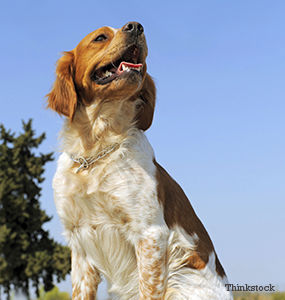Background
The Brittany takes its name from a French province of the same name. His breeding records are largely speculative but his physical appearance might suggest that the Brittany shares blood ties with the Welsh Springer Spaniel.
Images of the Brittany have been found on 17th century tapestries, but the first written account was in 1850 when Reverend Davies chronicled small bobtailed hunting dogs.
The Brittany is an excellent hunter, able to point and retrieve, characteristics which made it very popular all across Europe in the 1900’s. In 1931 the Brittany found his way into America, where he enjoyed a very similar popularity.
Sizing up
- Weight: 26-43 lbs
- Height: 17 – 20.5
- Color: Orange/white; liver/white; black/white; black roan; liver roan.
- Coat: Medium/flowing.
- Life expectancy: 12 to 14 years

Breed Traits
The Brittany is a highly energetic and fun loving breed. Early socialization is a must as without it he will likely develop social anxiety. Even with proper socialization the Brittany will probably be leery of strangers and will act as a great watchdog.
The breed is often sensitive. Light corrections will be all that are necessary during the initial training period. Neutered males might be even more sensitive than females so you should be especially careful when correcting them.
The Brittany requires plenty of exercise: lengthy walks and a fenced in yard. Without proper exercise the Brittany will be difficult to control, and might even seem crazy at times. With proper exercise they’ll be polite and eager to please you. They love spending time with the family and might me protective of them as well.
Generally, the Brittany is a healthy dog but should have their ears cleaned often as all floppy eared dogs are likely to trap moisture in the ear canal. The might also be affected by canine discoid lupus erythematosus.
Right breed for you?
- Exercise requirements: The Brittany must be kept busy during the day, boredom can lead to undesirable behavior.
- Grooming: regular brushing is important.
If you have any questions or concerns, you should always visit or call your veterinarian – they are your best resource to ensure the health and well-being of your pets.

